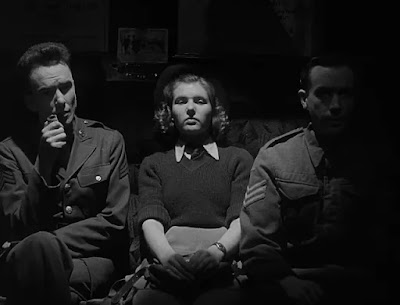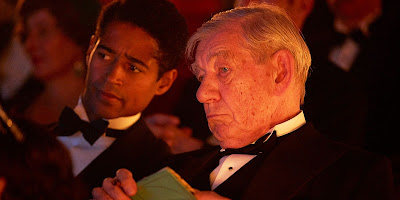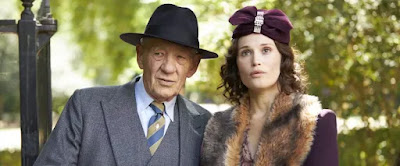or
The President's a Red Hulking Jerk (So What Else is New?)
The new Captain America movie—Captain America: Brave New World—has been the #1 movie of the past three weekends, so it was about time I checked it out. It's the first new "Cap" movie with the retirement of the Steve Rogers (Chris Evans) character in Avengers: Endgame, and after a Disney+ series try-out, Anthony Mackie gets to stop being called The Falcon and being called Captain America in an actual movie from Marvel Studios.
Too bad he feels like a co-star in his own movie, as the character flails around trying to solve a government conspiracy involving the big dump of adamantium that's been sitting in the Indian Ocean since The Eternals (and that was—what?—four years ago?), while at the same time a villain from the past (2008, specifically, but from another Marvel movie series from a previous studio), who has supposedly been rotting in a secure jail-cell somewhere apparently isn't and has his own plans for—muah-ha-ha—revenge. Already the "Brave New World" title of the movie feels like a stretch as it seems to be recycling old dangling plot-threads from the less-than-successful Marvel movies of the past.And speaking of recycling, Harrison Ford takes over for the late William Hurt (who took over from Sam Elliott) playing General Thaddeus "Thunderbolt" Ross, who has previously been a thorn in The Avengers' boots and has parlayed that into becoming President of the United States (Ford is President again? Man, we ARE recycling). And as much as Ford tends to dominate the proceedings of the film, he overshadows Mackie's Sam Wilson/Cap and (I think) to the film's detriment.So, the film begins after the events of "The Falcon and the Winter Soldier" (which I never saw, but it apparently doesn't matter much) where Cap and the new Falcon, Joaquin Torres (Danny Ramirez) take part in an undercover operation in Mexico to stop a mercenary named Sidewinder (Giancarlo Esposito), who works for "Serpent" guess they're bad guys—to recover some MacGuffin (which turns out to be refined adamantium that the Japanese government had secured from that Eternals thing which has now been called "Celestial Island"). Don't worry if all of that sounds new, because it is, and no, you haven't missed anything.Anyway, mission accomplished with the help of Cap's new, improved vibranium-infused wings from Wakanda and a lot of gee-whizardry. Despite doing well in Mexico, Cap insists that Torres train with one of America's super-soldiers, one Isaiah Bradley (Carl Lumbly, always enjoyable), who was introduced in the Disney+ series. Long story short, he was a super-soldier in Korea, but had been imprisoned by the government for the past 30 years...but isn't now. Cool.After the successful mission, everybody gets invited to the White House to meet the President (both the U.S. and Japanese variety), but while Ross is giving a presentation on how the world should be safe-guarding and sharing adamantium for the world's benefit (unlike those Wakandans!) and doing one of those "it's-for-your-own-good" speeches that American Presidents do, phones start erupting with a song by The Fleetwoods, which turns some in the audience—including Bradley—into "attack" mode (actually, The Fleetwoods aren't that bad!) and they start firing on the President. A big melee happens and Bradley is taken into custody even though he can't remember anything about trying to shoot the President. It's back to prison for Bradley, and Cap is on the "outs" with Ross because Cap's friend tried to shoot him.Anyway, you get the gist. An international plot (that may involve World War III!) with personal repercussions for our Captain, and it just gets so complicated with mind-controlling cell-phones, nobody trusting anybody, Ross' potential heart-problems, on top of the lamest of character motivations at this late date—how now-President Ross feels so bad that he's estranged from his daughter Betty (Liv Tyler) because he tried to kill her ex-boyfriend, Bruce Banner, The Hulk (back before he was Mark Ruffalo) making everything a bit of a mish-mash.
That last bit—the daughter thing—undercuts the movie quite a lot, and although Ford plays it gamely, it's a bit of weak tea for motivation, especially given the higher stakes globally, and finally makes President Ross a bit of a lame character, where his ambitions as President pale to his "just wanting to get along" with his own kid. If it was really such a big deal as the movie makes it out to be, it wouldn't be resolved so soporifically as it is in the movie.
But what am I complaining about, nobody cares much for all that thin "character stuff," as what they really want to see is Ross turn into The Red Hulk because it's promised in the poster and the previews. Given the character's history with the Green Hulk, this is irony with a capital SMASH! and, frankly, has nothing to do with the rest of the movie other than that the same bad guy responsible for all the mind-controlling has been setting up the Third Act Hulkitude as well, just so that...Ross can look bad in front of his daughter, frustrating him into full chili-pepper berserker mode. Oh, and cause all sorts of damage to prominent monuments...and cherry trees.One senses in that final Cap vs. Red Hulk confrontation that a lot of screenplay back-filling was done in order to bring it about (there are five credited screenwriters), but even given the cheesiness that goes into a lot of the funny-book verisimilitude, the efforts here strain the goodwill needed in order to accept it. I mean I know it's based on comic books and superheroes, but it takes a Hulk-style leap of faith to accept the ways and means it takes to get there. It takes a lot of the geek-fun out of it to know you're being played. Still, it IS good to see Tim Blake Nelson come back. He's a good actor, a good director, and a heck of a nice guy. He plays evil good, too. But, just as he was ill-served in The Incredible Hulk movie so many years back, he's ill-served by this one, too.So, it's disappointing, especially because it's Anthony Mackie's first Captain America movie and I've always liked him. And because...legacy. Of all the Marvel properties, the Captain America series was the last of the "majors" to come out before the first "Avengers" movie, and the studio managed to work with its old-fashioned and, frankly, jingoistic tendencies and make it work well. In fact, they did their job so well that the Captain America series was the one trilogy of movies in the Marvel stable that didn't falter in any of its three films.































%20eyes.jpg)
.jpg)


















